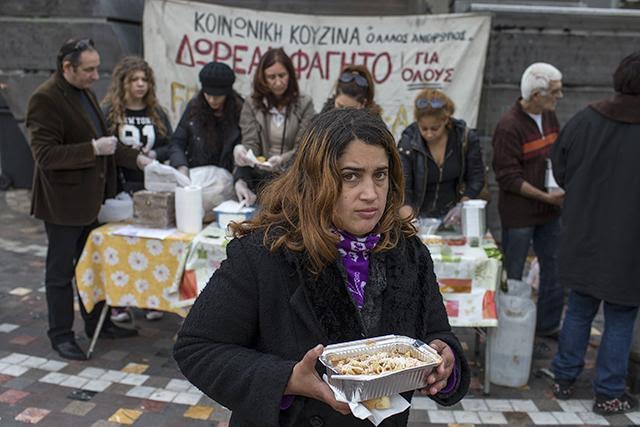Greek media blackout of “Oxi”
Irish people remember the incredible media bias during the Lisbon, Nice and “Austerity Treaty” referenda. That was nothing compared to the depths the media, in Greece and globally, sank to before the 5 July referendum. 36 people were interviewed in one a Mega TV bulletin, and surprise surprise, every single one of them was going to vote Yes.A bulletin on the Antenna network gave the Yes side 14.5 minutes, then covered the No side for only 90 seconds. Mega TV gave the No side 40 seconds, and the Yes side 70 minutes. Shots of Tsipras were accompanied with sinister music and lurid red captions saying “Shame.”
Images of ATMs, none of soup kitchens
When the European Central Bank cut off funds and forced the banks to close, the global media portrayed this as being somehow the result of “reckless”,“far-left policies” rather than an act of deliberate sabotage by the ECB. The international media then bombarded us with images of “Yes” rallies. In reality, the biggest “Yes” demonstration was at most 30,000-strong. On the same night there was a “No” demonstration of 200,000. One meme shared on Greek social media hit the nail on the head: “If the media, for every queue at an ATM, had shown one queue at soup kitchens and food banks, things would be different by now!”
Pollsters and media exposed as frauds
Greek polling companies were exposed as frauds when the apparently “close” vote ended up with a 61.3% No. The Greek media were shown up for how little they represented the vast majority of people and how ineffective their lies and threats were. The only exception was the state broadcaster ERT, which in contrast to Ireland’s “Regime Telefís Éireann”, gave relatively fair coverage. ERT was at the centre of a major struggle in 2013 when the previous government tried to shut it down. The whole station ended up being run democratically by striking workers.
TV station run by shipping family
Mega TV is Greece’s biggest private network, owned by one of the wealthiest shipping families in the country. Privately-owned media generally boils down to a well-funded operation for promoting rich people’s political views – views that tend to be right-wing, anti-worker and anti-poor. When we talk about “solidarity with the people of Greece” we should make it clear that we mean workers, young people, the unemployed, pensioners and middle-class people, not the capitalist class in Greece. It is the shipping owners, the bankers, the tax-dodging millionaires and the like who caused this crisis, and who are now hand-in-hand with the EU and IMF, insisting on more cuts.
“Serious”, “Responsible”, “Credible” class war
Austerity has completely failed in Greece; wrecking living standards and the economy. But still, in Ireland and around the world, austerity policies are referred to as “necessary structural reforms” and “bailout conditions”. Junker, Merkel and all those who demand even more of these completely anti-social and destructive policies are referred to as “serious,” “responsible” and “credible.” For proposing some fairly timid changes to their conditions, the Greek government are described as “aggressive,” “provocative,” “reckless” and “dangerous.”
What bailout for Greece?
Soon after the vote, the Irish Times and RTÉ were quick to tell us that a “Third Greek bailout could cost Ireland €1 Billion”. In reality, there has not been one “bailout of Greece”, let alone three. Greece, like Ireland, has been a conduit for a massive bailout of European banks. This money was given to the Greek government and destined not for the people but for paying off crumbs of an unsustainable debt. This money comes with strict conditions attached: cuts, new taxes, privatisations, attacks on labour rights. These conditions amount to a looting of Greek society, not a “bailout.”












